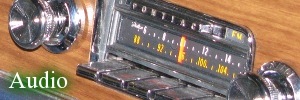















High Gas Prices Prompt Consumers to Take Another Look at Diesel Cars |
|---|

|
John Birchard
Washington, D.C.
June 3, 2004
Audio Version 458KB RealPlayer
Many American motorists have not yet altered their driving habits or their vehicle purchases because of historically high gasoline prices, but some are beginning to look for ways to cut the cost of driving.
The last time gas prices were this high, in the 1980s, Americans tried diesel-powered cars and firmly rejected them as being noisy, smelly, smoky and slow.
The Diesel Technology Forum represents the makers of diesel engines, diesel vehicles, diesel fuel and emission control devices. The Forum's executive director, Allen Schaeffer, says Americans have given the cold shoulder to his favorite form of power. "Here in the U.S., diesels account for less than one-half of one percent of all new vehicle sales last year, compared to Europe which has about 42 percent of all new vehicle sales last year were diesel models," he said.
We asked Mr. Schaeffer what causes this extraordinary gap between American and European vehicle buyers. One answer, he said, is European governments' social policy.
"The tax structure in Europe favors diesel over gasoline at the moment, and that has created a favorable condition," he noted. "I think also, though, over time, in the last few years particularly, the Europeans have recognized the real performance benefits of diesel technology."
Not only does the modern diesel achieve between 20-40 percent better fuel economy than a comparable gasoline engine, it's got plenty of acceleration.
When every other carmaker dumped the diesel from the U.S. market, Volkswagen hung in, continuing to offer diesel versions of its Golf, Jetta and New Beetle. Now, a diesel-powered edition of its mid-size Passat sedan is on sale here. Company spokesman Tony Fouladpour.
"This summer, with gas prices going well above $2 (per U.S. gallon) in most areas, we've seen an even bigger increase in interest in TDI engines," he said. "So, we may not have had people that looked at a Turbo Direct Injection diesel engine [before], come into the showroom and ask to drive it."
The Diesel Technology Forum's Allen Schaeffer said that the cost of both gasoline and diesel fuel has gone up lately, but gas has gone up further faster, adding 52 cents for each U.S. gallon from a year ago, while diesel fuel has increased by less than half that amount or about 25 cents. Still, he said, the oil industry favors the marketing of gasoline. "Right now, it [the price] is favorable for diesel, but what we would like to see is a stronger commitment for more diesel products in the U.S. in the coming years," he said.
As good as the new diesel technology is, and it's very good, the engine has a high hurdle to clear in the looming, far tighter federal air pollution standards. California and four northeastern U.S. states have already adopted the standards and that's making it tough on Volkswagen, says Tony Fouladpour.
"Currently, we're able to sell [diesel] cars in all states except for those five states that adopted the stringent standards years earlier," he noted. "But we're very bullish [optimistic] that, once we get the better fuel, the lower sulfur fuel, which will be legislated for 2006, that we can meet those standards."
In the battle for fuel efficiency and clean air, Toyota and Honda have spearheaded the move to hybrid gasoline-electric vehicles, but Tony Fouladpour says, don't look for Volkswagen to follow.
"Our strategy right now is to look at high-tech diesels, to look at high-tech combustion engines, look at cleaner fuels, synthetic fuels ultimately," he said. "And then, at some point, but we think it's many years down the line, look at hydrogen. We think that's probably about 25 years down the line, however."
In the near-term, Mercedes-Benz is joining Volkswagen in betting Americans are ready to give diesels a second chance. They have now brought back a diesel version of their E-Class sedan to the U.S. market.
